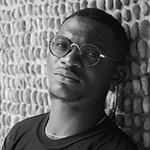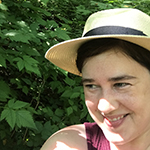Magicicada: A Triptych
I
there was no need for lessons
morsels ingested by ear
digested with love
are apples that fuel buzzing
around the mid-May maple
or mom in a house dress
printed with rose and lime butterflies
standing still like the streetlight that yawns
sodium sun to put us to bed
I can’t remember the words I knew then
cannot make this real
anymore than tell you if it was really butterflies
on her dress or cicadas breaking the air
did I cry to my brother joyously, 我也是蚱蝉!
almost certainly not but I want to have so
I might have had more to lose
than pollen off dirty knees look at these wings
I know cicadas are not the same as butterflies
but I too will turn like 天蚕
when I go to Kindergarten next year
II
read only yinglish
III
17 years of maple bred only silence
but a cycle on this American soil, roots of silver birch
gunpowder stolen in the blood
words locked in bones give birth to language
feed on necrotic xylem
unfold these wings and ride this railroad
this metaphor is mixed so mixed up
mixed up Mother Goose is so mixed remixed
the terms to explain how to hate us less
are also not mine but I think I think on them
as you pretend to think on The Lord
and they fill they will fill still they fill elastic collisions alias a standstill
it’s not an Asian fetish it’s just racism China = bad as an axiom leads only to tautologies
fill they fly half thoughts flutter in your cheek attack with gross butterfly kisses
this is not murmur anymore murmuration lock jawed no longer but to choose
pick words out of this swarm it’s not buzzing it’s sirening not your words they turn to
interrogate why you are so late you did nothing great there was no bargain but for comfort
no heat you mammal you wouldn’t rather die fucking than be left a nymph in the ground up
turn the sound up the nuanceand the timbredon’t matter thinkonit in stillness butthis brood this
chewing flyinyourmouthwhenyouwon’t shut youryellowfacexiaolongbaohole flingeachscrap
your therapist wouldbesopround right now in the madness inthemenance to be ashell
nottheshell yet mademad madden madmadmadmadmadmadmad adam
madmademadmadmad
madmadmadmadmadmadmadmadmadmadmadmadmadmadmadmadmadmadmadmadmdma
…and drop

Roy is a queer, polyamorous, Chinese-Canadian poet living in Brooklyn where he works as a data consultant. He has had work appear in Prairie Fire, and The Windsor Review. He also has reviewed poetry for ARC and The Globe & Mail.

 BACK TO ISSUE
BACK TO ISSUE







